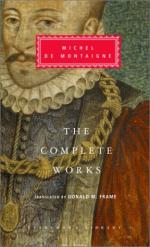
|
| Name: _________________________ | Period: ___________________ |
This test consists of 15 multiple choice questions and 5 short answer questions.
Multiple Choice Questions
1. What religion did Montaigne's mother belong to?
(a) Islam.
(b) Catholicism.
(c) Protestantism.
(d) Judaism.
2. Which of the following does NOT well-classify the quotations that Montaigne uses throughout his essays?
(a) Diverse.
(b) Short.
(c) Numerous.
(d) Inexplicable.
3. What character trait does Montaigne say are specifically brought about by a particular treatment of children by parents?
(a) Sadism.
(b) Cowardice.
(c) Ignorance.
(d) Indolence.
4. Montaigne describes how soldiers sometimes do what in desperate times?
(a) Sell their horses and armor.
(b) Drink the blood of their horses.
(c) Trade their war horses for normal mounts.
(d) Eat their horses.
5. Near the end of Book 1 of Essays: Chapter 3, Montaigne discusses two men who suffer from what?
(a) The plague.
(b) Epilepsy.
(c) Suicidal thoughts.
(d) Hallucinations.
6. In one of Montaigne's stories, the man who performs a kind of social experiment on people of a lower social station had what profession?
(a) Judge.
(b) Scholar.
(c) Politician.
(d) Psychologist.
7. The unusual book that Montaigne's father came into possession of was written using the words endings from what language?
(a) Spanish.
(b) French.
(c) Latin.
(d) Italian.
8. Who is the father of the noble who is discussed in Book 1 of Essays: Chapter 4, Essay #46?
(a) King Phillip of Spain.
(b) King Ferdinand of Normandy.
(c) King Henry II of England.
(d) King Gustav of Germany.
9. What subject does the first essay from Book 2 center on?
(a) Governance.
(b) Human behavior.
(c) Vice.
(d) Virtues.
10. What does Montaigne suggest is essential in order for a person to lead a good life?
(a) Discipline.
(b) Parental affection.
(c) A strong family.
(d) Religious dedication.
11. How often does Montaigne criticize the book that he translated in his discussion of it?
(a) Very often.
(b) His discussion is full of criticism.
(c) Occasionally.
(d) Never.
12. The creature that Montaigne discuss near the end of Book 2 of Essays: Chapter 7, Essay #12 is able to exert a limited control over what?
(a) Its predators.
(b) Its climate conditions.
(c) Its neighbors.
(d) Its food supply.
13. In one of Montaigne's stories, the people who have a kind of social experiment performed on them are what?
(a) Beggars.
(b) Servants.
(c) Factory workers.
(d) Travelers.
14. What creature dose Montaigne discuss near the end of Book 2 of Essays: Chapter 7, Essay #12?
(a) The raccoon.
(b) The rat.
(c) The hedgehog.
(d) The mole.
15. The philosopher that Montaigne quotes on the subject of authority believes that authority is most secure when derived from what source?
(a) Power.
(b) Friendship.
(c) Skill.
(d) Divine right.
Short Answer Questions
1. In Montaigne's story about the man leading a large number of troops, what moves the man to act with mercy?
2. Montaigne suggests that it is difficult to do what with war horses?
3. Montaigne says that he feels what way with regards to knowing one individual who was brought back to Christianity due to the arguments in the book he discusses in Book 2 of Essay's: Chapter 7?
4. Montaigne suggests that the difference between a man and an animal is less than the difference between a man and what?
5. The noble who is discussed in Book 1 of Essays: Chapter 4, Essay #46 holds a feast for whom?
|
This section contains 511 words (approx. 2 pages at 300 words per page) |

|




